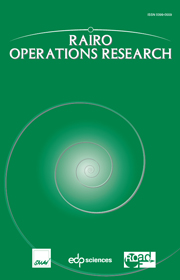Crossref Citations
This article has been cited by the following publications. This list is generated based on data provided by Crossref.
Pierson, Jean-Marc
Melab, Nouredine
Miquel, Maryvonne
Morvan, Franck
Talbi, El-Ghazali
Tchounikine, Anne
Gossa, Julien
Wehrle, Pascal
Cardenas, Yonny
Cahon, Sbastien
El Samad, Mahmoud
Brunie, Lionel
Dhaenens, Clarisse
and
Hameurlain, Abdelkader
2007.
GGM: Efficient Navigation and Mining in Distributed Genomedical Data.
IEEE Transactions on NanoBioscience,
Vol. 6,
Issue. 2,
p.
110.
Coello Coello, Carlos A.
Dhaenens, Clarisse
and
Jourdan, Laetitia
2010.
Advances in Multi-Objective Nature Inspired Computing.
Vol. 272,
Issue. ,
p.
1.
Srinivasan, Sujatha
and
Ramakrishnan, Sivakumar
2011.
Evolutionary multi objective optimization for rule mining: a review.
Artificial Intelligence Review,
Vol. 36,
Issue. 3,
p.
205.
Srinivasan, Sujatha
and
Ramakrishnan, Sivakumar
2012.
Multi Objective Optimization of classification rules using Cultural Algorithms.
Procedia Engineering,
Vol. 30,
Issue. ,
p.
457.
Srinivasan, Sujatha
and
Ramakrishnan, Sivakumar
2012.
Dominators vs pure dominators on the accuracy of a classifier with a multi objective cultural algorithm.
p.
90.
Corne, David
Dhaenens, Clarisse
and
Jourdan, Laetitia
2012.
Synergies between operations research and data mining: The emerging use of multi-objective approaches.
European Journal of Operational Research,
Vol. 221,
Issue. 3,
p.
469.
Srinivasan, Sujatha
and
Ramakrishnan, Sivakumar
2013.
A social intelligent system for multi-objective optimization of classification rules using cultural algorithms.
Computing,
Vol. 95,
Issue. 4,
p.
327.
Srinivasan, Sujatha
and
Ramakrishnan, Sivakumar
2013.
Advances in Computing and Information Technology.
Vol. 178,
Issue. ,
p.
141.
Mukhopadhyay, Anirban
Maulik, Ujjwal
Bandyopadhyay, Sanghamitra
and
Coello, Carlos A. Coello
2014.
Survey of Multiobjective Evolutionary Algorithms for Data Mining: Part II.
IEEE Transactions on Evolutionary Computation,
Vol. 18,
Issue. 1,
p.
20.
Pokorný, Jaroslav
Škoda, Petr
Zelinka, Ivan
Bednárek, David
Zavoral, Filip
Kruliš, Martin
and
Šaloun, Petr
2015.
Big Data in Complex Systems.
Vol. 9,
Issue. ,
p.
29.
2016.
Metaheuristics for Big Data.
p.
161.
Calvet, Laura
Armas, Jésica de
Masip, David
and
Juan, Angel A.
2017.
Learnheuristics: hybridizing metaheuristics with machine learning for optimization with dynamic inputs.
Open Mathematics,
Vol. 15,
Issue. 1,
p.
261.
Daly, Grant
Benton, Ryan
and
Johnsten, Tom
2018.
A Multi-Objective Evolutionary Action Rule Mining Method.
p.
1.
Dhaenens, Clarisse
and
Jourdan, Laetitia
2019.
Metaheuristics for data mining.
4OR,
Vol. 17,
Issue. 2,
p.
115.
Hussain, Kashif
Mohd Salleh, Mohd Najib
Cheng, Shi
and
Shi, Yuhui
2019.
Metaheuristic research: a comprehensive survey.
Artificial Intelligence Review,
Vol. 52,
Issue. 4,
p.
2191.
Srinivasan, Sujatha
and
Muruganandam, S.
2020.
Intelligent Computing and Innovation on Data Science.
Vol. 118,
Issue. ,
p.
117.
Dhaenens, Clarisse
and
Jourdan, Laetitia
2022.
Metaheuristics for data mining: survey and opportunities for big data.
Annals of Operations Research,
Vol. 314,
Issue. 1,
p.
117.

